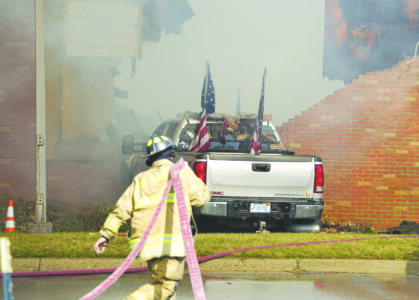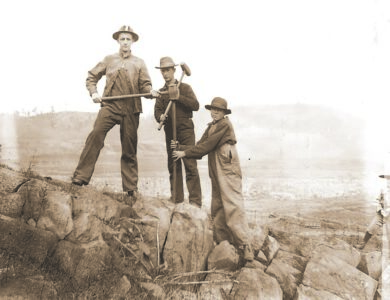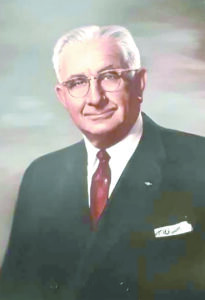Letters sent home illustrate lives of WWI soldiers
During World War I, both the Iron Ore and The Mining Journal would publish letters written by those serving in the war. Many of those letters were written to parents or friends and then shared with the public.
The letters had to pass through censors, so exact locations of soldiers often could not be given, but they served to give those back home an idea of what the men were going through.
This first letter was written by Walter Sterne to his father Albert:
“I have just received word that I had been admitted to the officer’s training camp at Fort Sheridan,” his letter reads. “I am tickled to death. They graded the applicants A, B and C. I was graded A, the highest possible grade. I will go out there today.
“I will be at Fort Sheridan for three months. While we will be put through a very stiff course of training, eight hours of drill and four hours of study, when we finish, we will be given commissions. One out of every three will go into active service, the other two will be put on reserve and held.
“We will be used to train the new army of 500,000 that will come by draft. So probably none of us will be leaving here until next spring a year from now.
“What do you know about it? I was out at Fort Sheridan yesterday and met my old roommate Tutthill from M.A.C. He is there to train like myself. He says there are a lot from M.A.C. there. We will have a great time.
“Fort Sheridan is on the lake and it ought to be nice and cool there this year. The weather is getting fine. We sleep in barracks and get good food.” (Mining Journal, May 14, 1917)
M.A.C. in his letter refers to the Michigan Agricultural College, now known as Michigan State University.
Harry VanHalla did not write a letter, but gave an interview when he was visiting his parents while on leave:
“The training we received at Fort Sheridan was wonderful,” said Mr. VanHalla. “Our officers were of the very best and although we had to work hard, we certainly enjoyed it.
“The men were greatly interested and the great majority of the recruits stuck to their work as though their very lives depended upon it. Our officers were of the class who inspired men with the right kind of spirit and there was no fooling there.
“I am more than pleased that I enlisted and I cannot recall a single man out of a great number of acquaintances who I can say is sorry for enlisting and among thee are many men who left very fine positions, with big salaries, sacrificing hundreds of dollars annually to become soldiers for their country.
“Personally, I am very anxious to go overseas, but I do not know where I shall land after I report in Hoboken, but I do hope I am sent to France.” (Mining Journal, August 20, 1917)
The next letter came from the front lines in France and was written by an Upper Peninsula man to a friend in Ishpeming:
“At the present moment shells are screaming and sizzling overhead,” he says. “You see, I am now at the front, attached for a few days to British troops, sort of getting a taste of what it is.
“I am in a German pill box, one that was captured this summer, and it is a very good shelter too, of such strength that it would take a direct hit by a large caliber shell to break it up.
“I left the British school last Saturday and drove thirty miles by motor lorry to get to the ruins of a town immediately behind the lines here. As we drove along, the troop hutments became thicker, traffic along the road increased and there were various other indications as to what we were approaching.
“We passed divisional baths and laundries where the fellows get rid of the vermin when they ‘come out’ and some prison corps cages where the prisoners are collected when a push is on. Spent the night in half a house which serves as the officers mess in _.
“Next morning a runner (messenger) took me and my steel helmet, smoke helmet, gas respirator and one blanket and we trekked across four miles of wrecked battlefield to this place. All of the ground is captured land and you can’t imagine how it has been shot to pieces by shells and mines. There was once a wood around this place, but now there is nothing but a lot of spars sticking up out of the clay and water filled shell holes.
“We passed large numbers of batteries in action, sending Fritz a few compliments. The few German shells that were coming over were falling two or three miles away.
“I am with the support troops just back of the front line and tonight we go up to take over the front line shell holes. The boche has shelled the immediate neighborhood only twice since I have been here. He fires in bursts on various places during the day.
“After I have been in the front, or forward area, for a few days I go back to the school for a night, then Paris for a day and then on to headquarters to report.
“On this front the British enjoy the mastery of the air and their planes fly around frequently. I have seen but two boche planes and they were forced to turn back when they tried to come over _.
“Mud certainly is not hard to find here — the yellow clay sort that is very sticky. It is only when one has seen this part of the world that one realizes why it is that a 500-yard gain is considered a wonderful bit of work.
“It is a big job keeping plenty of food and ammunition for the men. Food is brought up to a certain point by motor lorry, after that by pack mules and then by carrying parties. Water must also be brought forward, as the Germans poisoned most of the wells as they fell back.” (Mining Journal, January 3, 1918)




